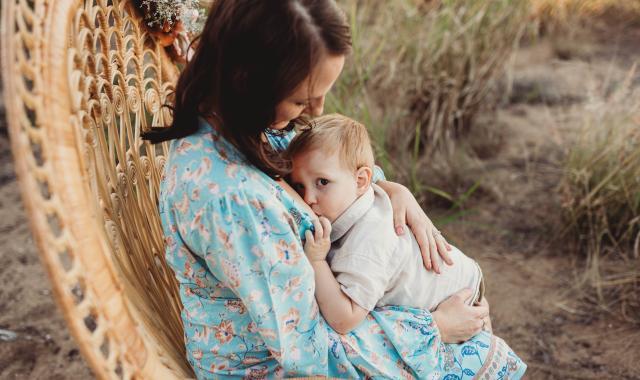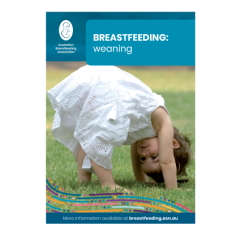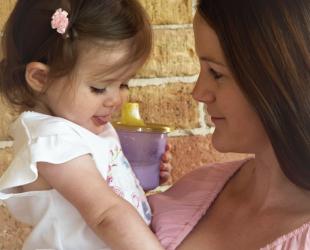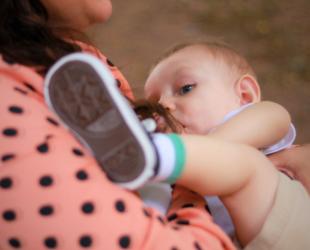With gentle tips and a little help, weaning your toddler can go smoothly

Well done for breastfeeding your child into toddlerhood! Breastfeeding has been a special way to connect with your child – comforting, healthy, and reassuring. Maybe you continued because it felt right or because you valued the benefits for your child’s growth.
Now, something has shifted. You might feel ready to stop, or life circumstances have changed, and you’re looking for practical ways to make the change smooth for both of you.
One of the first steps is helping your child adjust to the idea of change.
Preparing your child
Even though your child may not understand everything, you can start gently talking to them about what’s going to happen. You could read picture books about growing up or create a little storybook showing how much they’ve grown, from being a baby to all the amazing things they can do now.
Along with talking to your child, setting gentle limits can make weaning feel more comfortable.
Setting limits
Here are some ideas that may help:
- Get up before your child: If they usually feed early, being dressed and ready for breakfast may help them skip the feed.
- Have set times for feeds: For example, only at home or after lunch, and keep favourite healthy snacks and drinks handy to distract them. Notice when they’re likely to ask for a feed and try to redirect them with a new activity or something different to eat or drink before they get restless.
- Discourage long feeds: Gently end them before your child falls asleep or finishes. You might say, “Time to finish now, let’s go for a walk,” or, “We’ll just have a little feed and then go to the park.” Offering a fun activity helps your toddler adjust to shorter feeds.
- Wear different clothes: Avoid clothes that make breastfeeding easy when out and about.
- Change the routine: Having friends or relatives care for your toddler may encourage them to accept other drinks and foods instead of breastfeeding. Children often respond differently with familiar people and may forget about a breastfeed.
- If your toddler needs to suck: Offering a bottle before moving to a cup, can help set limits on breastfeeds and still provide comfort.
- Never offer, never refuse: If you feel uncomfortable about refusing when your toddler asks for a feed, this approach may work for you.
Easing away from feeding to sleep
Dropping feeds at sleep times can be challenging because breastfeeding is often the easiest way to help your toddler fall asleep or settle back to sleep if they wake during the night.
To help break the link between breastfeeding and sleep, try some of these tips:
- Gradually increase the time between your child’s sleep-time feed and putting them to bed.
- Introduce a new bedtime routine that doesn’t involve feeding to sleep. Focus on comforting activities like singing, rocking, reading, or patting.
- Shorten breastfeeds so they’re just long enough to relax your child, placing more emphasis on the story or song than the feed itself.
- If your child wakes at night, your partner might help settle them with a cuddle or a drink of water.
- Even if you still bring your toddler into your bed, try comforting them in other ways before offering a breastfeed. Over time, you may notice your child moving from feeding for comfort to being comforted in other ways.
With gentle changes to your routine and plenty of comfort, your child can gradually learn to fall asleep without breastfeeding.
Taking your time
Gradual weaning can make the change easier for both you and your child. Try dropping one feed every few days, letting your child and your body adjust slowly. If your breasts feel full, express just enough milk to stay comfortable. It’s normal for weaning to take several months, and your breasts may keep making milk for a while after your child has stopped breastfeeding.
When your toddler isn't ready
Sometimes, even with gentle changes, your toddler may find it hard to let go of breastfeeding. If you’re ready to stop breastfeeding but your child isn’t, you might feel tense or frustrated. Your child may sense your feelings and ask for more feeds, which can make things harder for both of you.
Try to notice what’s challenging for you. Are there certain times or situations that make feeding difficult? Are you feeling pressure from others, or is sleep being disrupted by night feeds? Talking to someone, like an ABA breastfeeding counsellor, can help you work through your feelings and decide what’s right for you.
Dealing with feelings
Your child’s feelings: Your child may act differently after weaning. They might be clingy, cross, or more independent. It’s all part of the adjustment. Sharing your feelings with someone you trust can help you find ways to support your child.
Your feelings: You might feel a deep sense of loss, sadness, or even grief after your last breastfeed, even if you were ready to wean or the process went smoothly. These feelings are very real and common. Many mums experience a strong emotional response when this special stage ends. Talking with another mum or an ABA breastfeeding counsellor may help.
© Australian Breastfeeding Association December 2025
Read more about weaning
Evidence-led info and practical tips from our Breastfeeding Information Series
Breastfeeding: weaning



